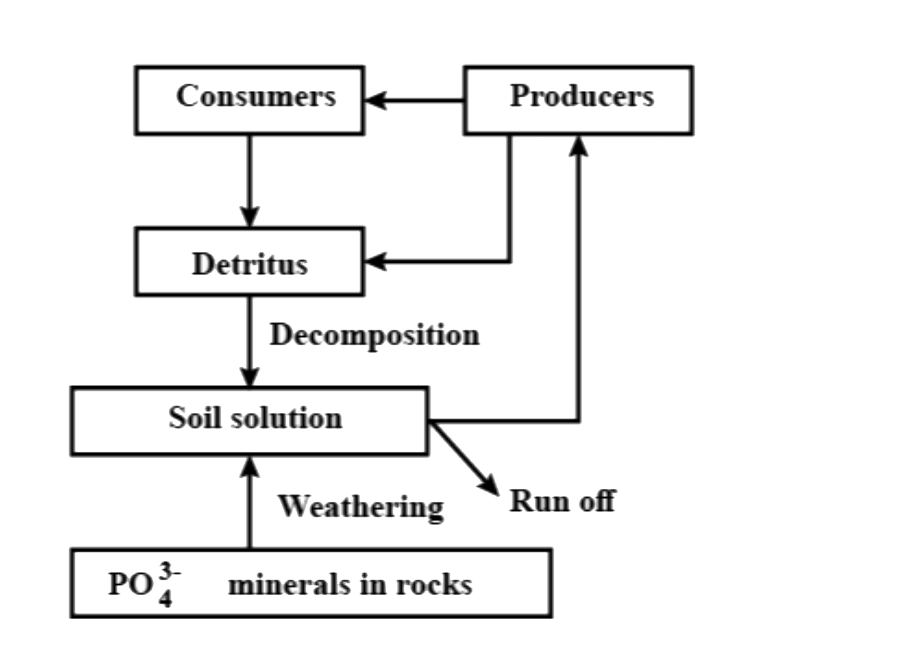Why are nutrient cycles in nature called biogeochemical cycles?
Step-by-Step Solution:
1. Definition of Nutrient Cycles:
Nutrient cycles refer to the natural pathways through which essential elements necessary for life are circulated in the environment. These cycles ensure that nutrients are reused and made available to living organisms.
2. Understanding Biogeochemical:
The term "biogeochemical" combines three aspects:
- Bio: Relating to living organisms (biological aspects).
- Geo: Relating to the Earth (geological aspects).
- Chemical: Involving the chemical processes and transformations of elements.
3. Components of Biogeochemical Cycles:
Each nutrient cycle involves interactions between living organisms (producers, consumers, and decomposers) and their non-living environment (soil, water, atmosphere).
4. Energy Flow in Ecosystems:
Energy flows directionally through ecosystems, starting from sunlight (solar energy) which is captured by producers (plants). This energy is then transferred to consumers (herbivores and carnivores) and eventually to decomposers (fungi, bacteria) that break down organic matter.
5. Role of Geological Processes:
Geological processes such as weathering, erosion, and the movement of tectonic plates contribute to the cycling of nutrients by redistributing elements across different parts of the Earth (land, water, and atmosphere).
6. Recycling of Inorganic Matter:
The recycling of inorganic nutrients between living organisms and their non-living environment is what defines biogeochemical cycles. This recycling is crucial for maintaining ecosystem health and sustainability.
7. Common Elements in Biogeochemical Cycles:
The six most common elements involved in these cycles are carbon, nitrogen, hydrogen, oxygen, phosphorus, and sulfur. These elements exist in various chemical forms and can remain in different reservoirs for extended periods.
8. Conclusion:
Therefore, nutrient cycles are called biogeochemical cycles because they encompass biological, geological, and chemical processes that facilitate the movement and transformation of essential elements necessary for life.
---
Nutrient cycles refer to the natural pathways through which essential elements necessary for life are circulated in the environment. These cycles ensure that nutrients are reused and made available to living organisms.
The term "biogeochemical" combines three aspects:
- Bio: Relating to living organisms (biological aspects).
- Geo: Relating to the Earth (geological aspects).
- Chemical: Involving the chemical processes and transformations of elements.
Each nutrient cycle involves interactions between living organisms (producers, consumers, and decomposers) and their non-living environment (soil, water, atmosphere).
Energy flows directionally through ecosystems, starting from sunlight (solar energy) which is captured by producers (plants). This energy is then transferred to consumers (herbivores and carnivores) and eventually to decomposers (fungi, bacteria) that break down organic matter.
Geological processes such as weathering, erosion, and the movement of tectonic plates contribute to the cycling of nutrients by redistributing elements across different parts of the Earth (land, water, and atmosphere).
The recycling of inorganic nutrients between living organisms and their non-living environment is what defines biogeochemical cycles. This recycling is crucial for maintaining ecosystem health and sustainability.
The six most common elements involved in these cycles are carbon, nitrogen, hydrogen, oxygen, phosphorus, and sulfur. These elements exist in various chemical forms and can remain in different reservoirs for extended periods.
Therefore, nutrient cycles are called biogeochemical cycles because they encompass biological, geological, and chemical processes that facilitate the movement and transformation of essential elements necessary for life.
Topper's Solved these Questions
- BOOK - ICSECHAPTER - ECOSYSTEMSEXERCISE - PRACTICE QUESTINS (VERY SHORT ANSWER TYPE QUESTIONS)24videos
ECOSYSTEMS
- BOOK - ICSECHAPTER - ECOSYSTEMSEXERCISE - PRACTICE QUESTINS (SHORT ANSWER TYPE- I QUESTIONS)9videos
ECOSYSTEMS
- BOOK - ICSECHAPTER - BIOTECHNOLOGY AND ITS APPLICATIONS EXERCISE - COMPETITION CORNER (OBJECTIVE TYPE QUESTIONS (ASSERTION AND REASON TYPE QUESTIONS))9videos
BIOTECHNOLOGY AND ITS APPLICATIONS
- BOOK - ICSECHAPTER - ENVIRONMENTAL ISSUESEXERCISE - COMPETITION CORNER (ASSERTION AND REASON TYPE QUESTIONS (FOR AIIMS ASPIRANTS))9videos
ENVIRONMENTAL ISSUES
Similar Questions
Biogeochemical cycling means
View SolutionName two types of biogeochemical cycles.
View SolutionState the function of a reservoir in a nutrient cycle. Explain the simplified model of carbon cycle in nature.
View SolutionState the function of a reservoir in a nutrient cycle. Explain the simplified model of carbon cycle in nature.
View SolutionThe cause of water cycle in nature is :
View SolutionWhat is a biogeochemical cycle. What is the role of the reservoir in a biogeochemical cycle? Give an example of a sedimentary cycle with reservoir located in earth's crust.
View SolutionThe diagram/flow chart represents which of the sedimentary biogeochemical cycle ?

(a) Nitrogen cycle
(b) Phosphorus cycle
(c) Oxygen cycle
(d) Sulphur cycleView SolutionExplain the oxygen cycle in nature.
View SolutionWhich one of the following is not a gaseous biogeochemical cycle in ecosystem?
View SolutionWhich one of the following is not a gaseous biogeochemical cycle in ecosystem?
View Solution
